Asiana’s cargo unit sale faces tough hurdles before KAL merger
No LCCs are emerging as buyers, big firms don’t have aviation licenses and foreigners are banned from acquiring it
By Nov 03, 2023 (Gmt+09:00)
LG Chem to sell water filter business to Glenwood PE for $692 million


Kyobo Life poised to buy Japan’s SBI Group-owned savings bank


KT&G eyes overseas M&A after rejecting activist fund's offer


StockX in merger talks with Naver’s online reseller Kream


Mirae Asset to be named Korea Post’s core real estate fund operator


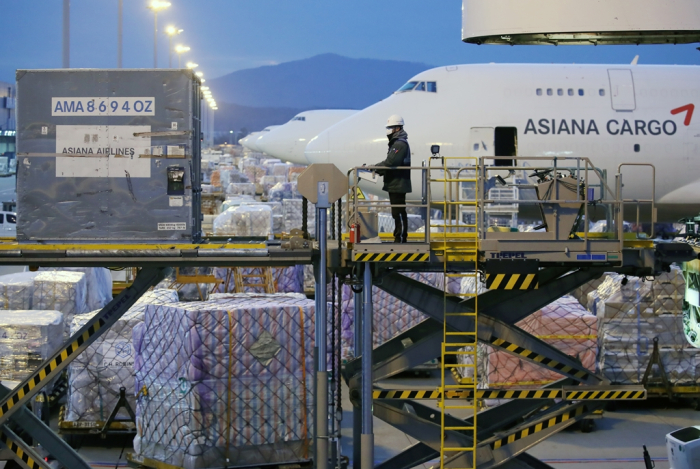
The proposed merger of Korean Air Lines Co. (KAL) and Asiana Airlines Inc. has moved one step closer to completion with Asiana’s backing of its cargo business sale on Thursday. The real test, however, is yet to come.
The hardest part, analysts say, now is to find the right buyer of Asiana’s cargo business as no domestic low-cost carriers (LCCs), which had been widely viewed as potential candidates, have emerged with a clear call.
Disposal of the cargo unit, required by aviation authorities in Europe and the US before their final approval of the merger, to Korea’s deep-pocketed large companies such as Samsung and Hyundai would also prove to be a tough sell as neither has a license to run an air cargo business.
Korean Air aims to sell Asiana’s cargo business by November 2024.
For a foreign airline to acquire Asiana’s cargo business is out of the question as that is banned under the Korean Aviation Law.
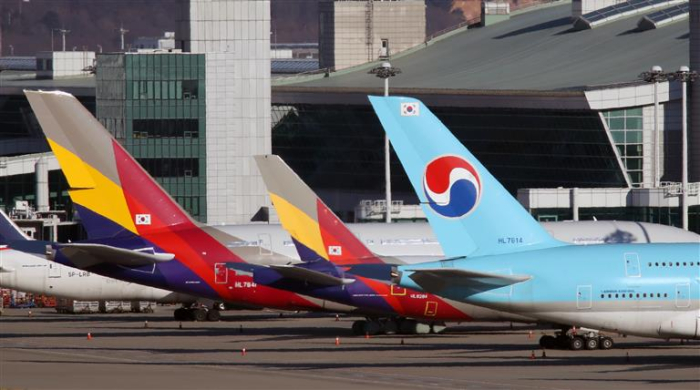
According to industry officials on Friday, T’way Air Co., a Korean budget carrier widely mentioned as the most likely candidate, is said to have declined an acquisition proposal.
Two other potential buyers – Eastar Jet and Air Premia – are also showing little interest in Asiana’s cargo business, industry watchers said.
“If you’re going to engage in the air cargo business seriously, you need to have large passenger aircraft capable of carrying extra cargo. Korean LCCs don’t have such planes as they don’t operate routes to North America and Europe, key air cargo routes,” said a Korean budget carrier official.
“Just having cargo planes does not guarantee the success of the business.”
AIR INCHEON, A DARK HORSE?
Asiana accounts for about a fifth of Korea's market for overseas air cargo. With 11 cargo planes, its service encompasses 21 routes to 25 cities in 12 countries, including the US, Germany and Russia.
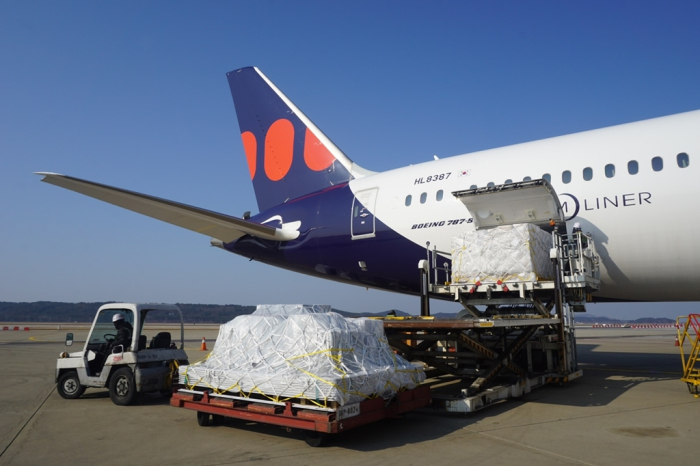
In the first half of this year, Asiana's North American routes made up the highest portion of its cargo revenue at 44% of its total, followed by Europe at 23%.
Some industry officials say Air Incheon, a Korean cargo airline, could emerge as the buyer to create synergy through the acquisition of Asiana’s cargo unit.
However, with only three of Asiana’s cargo planes having less than 25 years of service life, substantial investment will be required after the acquisition, making it a tough decision for Air Incheon.
Aircraft must be retired after 30 years of service.
Capitalized at 7.2 billion won ($5.4 million), Air Incheon posted 107.9 billion won in sales last year – a thirtieth of Asiana’s 2022 sales revenue of 3 trillion won.
A domestic private equity fund, Socius Aviation, is known to be Air Incheon’s largest shareholder.
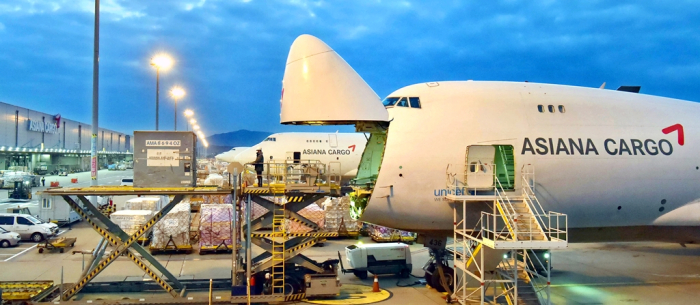
Under Korean aviation law, it usually takes two years for a company to receive a license to operate the air cargo business, making it hard for big Korean conglomerates to acquire Asiana’s cargo unit before KAL’s proposed sale deadline of November 2024.
“If the Ministry of Land, Infrastructure, and Transport feels the situation is urgent, it may be tempted to grant a Korean big company the license faster,” said an industry official.
MONOPOLY CONCERNS
The proposed sale of Asiana’s cargo business comes after the European Commission (EC), the antitrust body of the European Union, rejected the merger of Korea’s top two full-service carriers in May, citing monopoly concerns following its preliminary review.
The Commission specifically asked Korean Air to come up with a remedy for Korean Air's and Asiana’s nearly 60% combined share of Korea-Europe cargo routes as of 2022.
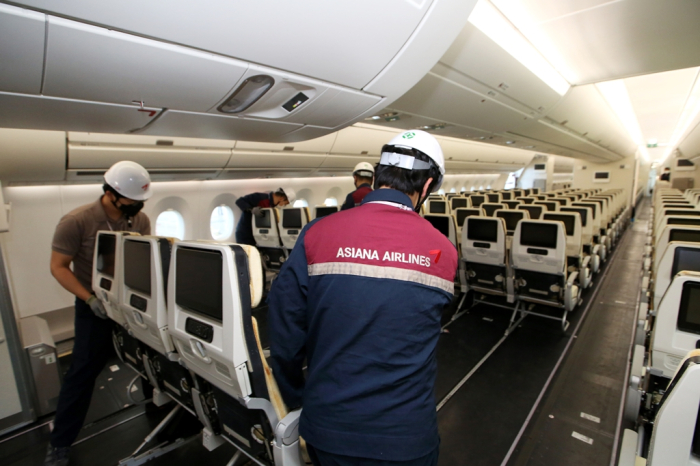
As part of efforts to ease its concerns, Korean Air has proposed to sell Asiana’s cargo business and give up its four lucrative routes between Korea and Europe.
The EU’s ruling is important because it is expected to affect the US' and Japan’s decision on the merger, which has already received the nod from the remaining 11 nations, including Korea.
The US antitrust agency in May also notified Korean Air of its decision to reject the purchase of Asiana if the deal leads to the creation of a dominant player with no strong rival in Korea’s aviation industry.
Korean Air agreed to buy beleaguered Asiana for 1.8 trillion won in November 2020, a deal expected to create the world’s seventh-largest airline.
Write to Jae-Fu Kim at hu@hankyung.com
In-Soo Nam edited this article.
-
 Mergers & AcquisitionsAsiana Airlines to sell cargo business for merger with Korean Air
Mergers & AcquisitionsAsiana Airlines to sell cargo business for merger with Korean AirNov 02, 2023 (Gmt+09:00)
3 Min read -
 AirlinesUS antitrust body blocks $1.4 bn Korean Air-Asiana deal
AirlinesUS antitrust body blocks $1.4 bn Korean Air-Asiana dealMay 22, 2023 (Gmt+09:00)
4 Min read -

-
 Mergers & AcquisitionsKorean Air vows to get nod from all antitrust bodies for Asiana merger
Mergers & AcquisitionsKorean Air vows to get nod from all antitrust bodies for Asiana mergerMay 23, 2022 (Gmt+09:00)
2 Min read -
 Mergers & AcquisitionsKorea approves Korean Air-Asiana merger; hurdles remain
Mergers & AcquisitionsKorea approves Korean Air-Asiana merger; hurdles remainFeb 22, 2022 (Gmt+09:00)
3 Min read -
 Mergers & AcquisitionsKorean Air wary of Asiana deal after EU blocks HHI-DSME merger
Mergers & AcquisitionsKorean Air wary of Asiana deal after EU blocks HHI-DSME mergerJan 14, 2022 (Gmt+09:00)
2 Min read -
 AirlinesKorean Air to buy rival Asiana in $1.6 bn deal to emerge as world’s 7th airline
AirlinesKorean Air to buy rival Asiana in $1.6 bn deal to emerge as world’s 7th airlineNov 16, 2020 (Gmt+09:00)
5 Min read


